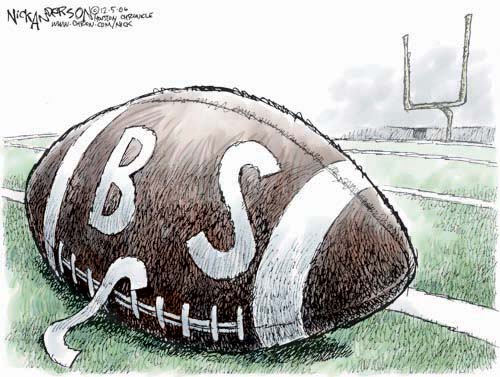Last Monday, the Auburn Tigers defeated the Oregon Ducks to win the BCS National Championship with a perfect 14-0 record. At the same time, the TCU Horned Frogs also finished their season undefeated at 13-0 with a Rose Bowl win against the Wisconsin Badgers. To those of us who watch college football, we write, talk, and fume over the fact that TCU will never get a chance this season to play Auburn with a national title on the line. Yet, there are those who claim that TCU does not deserve a chance because the conference they play in is not as tough as the SEC/ACC/Big 10/Big 12/PAC-10/Big East. Others have said that TCU had their hands full with Wisconsin by defeating them by 2 points, so Auburn would run them out the stadium. Those who make the claim about TCU not deserving a shot at Auburn claims the BCS got it right once again because the two best teams in college football played for the National Championship, according to the BCS system. But if one was to sit and really think about the BCS system, they will see that the BCS is using a mathematical formula that takes and analyzes different variables like strength of schedule and poll rankings and give the likelihood that a team will end up in the championship if we have a playoff. The BCS gives each team a percentage to the ten- thousandth place. The final BCS standings before the bowls gave Auburn a .9866, Oregon a .9720 and TCU a .9102 (for all the BCS points, check http://espn.go.com/college-football/bcs). The BCS standings says that Auburn had a 98.66% chance of making the championship, Oregon a 97.20% chance, and TCU a 91.02%. The BCS is one big mathematical assumption. By quantifying season long information, the BCS can mathematically decide who will win the playoff games. If that same idea was used in other sports: the 2008 Super Bowl would not have had the NY Giants it; the George Mason Patriots would not have made it to the Final Four and the Butler Bulldogs would not have made it to the National Championship of basketball last year; the Florida Marlins would have never had a World Series title in 1997 or 2003; The Golden State Warriors would have never beat the Dallas Mavericks in the First Round of the NBA playoffs. The list can go on and on from times in sports history where the team that was considered inferior to their opponent won the games objectively on the field. And that is the problem with determining a national champion by using the BCS mathematical formula. The two participants are decided subjectively, not objectively by playing the game on the field. Looking at Auburn and TCU from outside the lens of the BCS, they match up fairly well. Both teams beat ranked opponents home and away (although TCU’s only away game against a ranked team was a blowout and Auburn’s only away game against a ranked team was decided by 1 point); offensively, Auburn is #7 averaging 499 yards per game of total offense and TCU is #12 averaging about 476.2 yards per game of total offense. Defensively, TCU is #1 in Total defense averaging 228.5 yard per game while Auburn is #60 with 368.4 yard per game of Total Defense (note: against non-MWC opponents, TCU is ranked #16 with 282.8 yards of total defense per game and Auburn is 365.2. Auburn’s total defense is the third lowest among SEC schools). Looking at those stats, TCU deserves a shot to play Auburn. But those who still support the BCS will point towards the conferences and strength of schedule and how the SEC is the toughest conference. First of all, saying the SEC is the toughest conference based on rankings is a bunch of crap. The rankings are given by the media who also hypes the SEC as the toughest conference in the nation. Now, in order to support their claim, the media HAS to rank those teams in the Top 25. So to say the SEC is tough because of how many teams are ranked is like Consumer Reports claiming Ford makes the best cars and point to their own poll to justify their claim. Secondly, TCU played a tougher non-conference schedule. Two of TCU’s non-conference opponents went to a bowl game (Baylor and SMU), while one of Auburn’s non-conference opponents (Clemson) went to a bowl game (overall, both teams’ non-conference opponents were below .500 TCU’s: 24-26, Auburn’s: 21-27). So looking at the two teams outside of the lens of the BCS, the two are pretty similar and TCU deserves a shot at Auburn on the field to prove that deciding games on the field is much better than deciding games by a mathematical formula.
Germain Favor, Guest Blogger for War Room Sports
